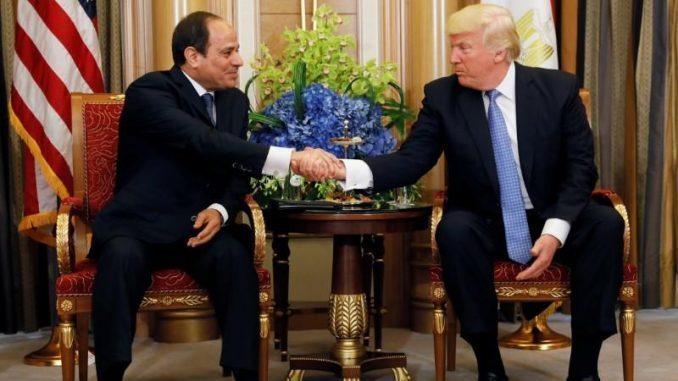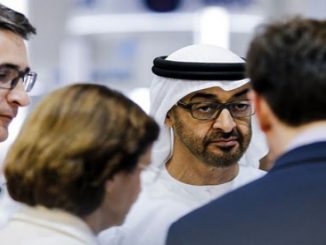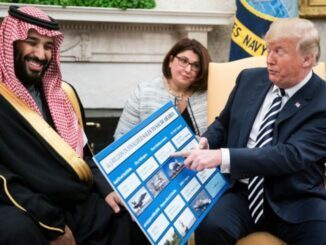
A new report has revealed that former Special Counsel Robert Mueller investigated links between the US and Egypt after $10 million was injected into the Trump presidential campaign 11 days before the 2016 election.
The cheque, which Trump wrote for the campaign, was his largest political contribution on record.
Initial investigations into the president hoped to answer whether or not Trump’s presidential campaign was supported by a foreign power, or if he was indebted to one, initially focusing on the Russian government interference in the 2016 elections.
An informant told investigators of another case of foreign influence on the campaign, that money from an Egyptian bank backed a last minute $10 million deposit into the campaign.
Intelligence said there was money in the Egyptian bank which could be connected to the donation he made, according to CNN.
The three-year investigation into whether Trump received an illegal foreign campaign contribution locked down a floor at a Washington courthouse so that Egypt’s bank records could be accessed and reached the Supreme Court, which declined to hear the case.
The probe also looked into whether Trump’s foreign policy advisor Walid Phares was secretly working for the Egyptian government to influence the incoming administration.
In 2016 Phares told Ivanka Trump in an email that he had arranged a meeting between Trump and Sisi that September: “Great that the meeting will take place tomorrow. This is a major victory in foreign policy. It will generate more votes.”
Sisi and Trump met on the sidelines of the UN General Assembly towards the end of 2016 presidential campaign. The close relations between the two has been documented, with Trump calling Sisi his “favorite dictator.”
Sisi was the first leader to congratulate Trump on winning the election.
Mueller has been criticized for not taking bold enough action to access Trump’s finances, whilst the counsel himself has said he suspected he would be fired if he did.
The complete story from CNN
For more than three years, federal prosecutors investigated whether money flowing through an Egyptian state-owned bank could have backed millions of dollars Donald Trump donated to his own campaign days before he won the 2016 election, multiple sources familiar with the investigation told CNN.
The investigation, which both predated and outlasted special counsel Robert Mueller’s probe, examined whether there was an illegal foreign campaign contribution. It represents one of the most prolonged efforts by federal investigators to understand the President’s foreign financial ties, and became a significant but hidden part of the special counsel’s pursuits.
The investigation was kept so secret that at one point investigators locked down an entire floor of a federal courthouse in Washington, DC, so Mueller’s team could fight for the Egyptian bank’s records in closed-door court proceedings following a grand jury subpoena. The probe, which closed this summer with no charges filed, has never before been described publicly.
Prosecutors suspected there could be a link between the Egyptian bank and Trump’s campaign contribution, according to several of the sources, but they could never prove a connection.
It’s not clear that investigators ever had concrete evidence of a relevant bank transfer from the Egyptian bank. But multiple sources said there was sufficient information to justify the subpoena and keep the criminal campaign finance investigation open after the Mueller probe ended.
CNN learned of the Egypt investigation from more than a dozen sources familiar with the effort, as well as through hints in public records, including newly released court documents and Mueller witness interview summaries, called 302s, that CNN and Buzzfeed obtained through lawsuits.
In a court filing last month, the Justice Department confirmed that when the special counsel’s office shut down in 2019, Mueller transferred an ongoing foreign campaign contribution investigation to prosecutors in Washington. Some of CNN’s sources have confirmed that the case, which Mueller cryptically called a “foreign campaign contribution” probe, was in fact the Egypt investigation.
The probe was confirmed this week by a Justice Department senior official who responded to CNN’s queries: “The case was first looked at by the Special Counsel investigators who failed to bring a case, and then it was looked at by the US attorney’s office, and career prosecutors in the national security section, who also were unable to bring a case. Based upon the recommendations of both the FBI and those career prosecutors, Michael Sherwin, the acting US attorney, formally closed the case in July.”
Part of what drew investigators’ initial interest in the matter was intelligence, including from an informant, that suggested there could have been money from an Egyptian bank that ended up backing Trump’s last-minute injection of $10 million into his 2016 campaign, according to two of the sources.
Among the chief questions prosecutors sought to answer and apparently never did was whether Trump was supported by or was indebted to a foreign power.
The investigation even went as far as the US Supreme Court, the only time during the two-year Mueller investigation a dispute went to the high court. The justices ultimately declined to hear the case.
Yet neither the special counsel’s office, nor prosecutors who carried on the case after Mueller, got a complete picture of the President’s financial entanglements. Prosecutors in Washington even proposed subpoenaing financial records tied to Trump, before top officials finally concluded this summer they had reached a dead end, the sources said.
As aggressive as Mueller’s office was — charging multiple Trump advisers for obstruction, gaining cooperators, indicting Russians for election-related malfeasance and documenting attempts by the President to obstruct justice — the special counsel has faced criticism, including from one of its own prosecutors, for not taking bold enough investigative steps to gain access to the President’s finances.
Jason Miller, a senior adviser to the Trump 2020 campaign, said in response to CNN’s questions, “President Trump has never received a penny from Egypt.”
A spokesman for the Egyptian President declined to comment.



